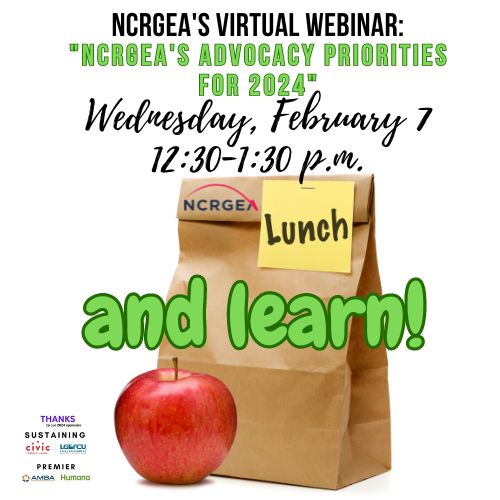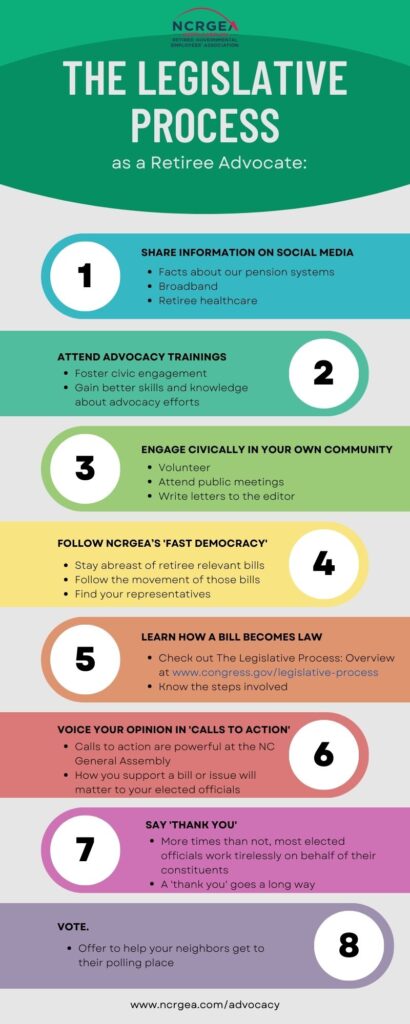INSIDE NCRGEA’s Advocacy Goals
Tracie Eubank
on
June 4, 2024
Spring 2024 Living Power Magazine

Each year, NCRGEA develops a set of legislative or advocacy goals that guide the work of the Association in the General Assembly and with the Pension Systems’ Board of Trustees.
“While we don’t have a formal process for gathering information from our members, an important part of this process is listening to what our members say,” said Linda Suggs, chairperson of NCRGEA’s Government Relations Committee.
This input, combined with advice from the Association’s lobbyists, is the basis for the initial draft of the annual goals.
“Our lobbyists give the Government Relations Committee a draft of goals based on the key issues the General Assembly will be dealing with in the up-coming session,” explained Suggs. “We take a hard look at those, review what our members have said, and then forward to the Executive Committee a second draft. They edit that if they see fit, and forward their draft to the Board of Directors for final approval.”
Each member of NCRGEA’s Board is a retired state or local government employee, and they, like its members, are concerned about having a strong, stable pension system that its members can count on. “NCRGEA does not rank its goals, but getting a true COLA for state and local government retirees is always its number one priority,” says Suggs. “Keeping the pension system strong is right behind it.”
NCRGEA has many active programs and processes in place to achieve its annual goals, but to be even more effective, the Association needs the voice of its members to be heard in the General Assembly.
“We really need our members to be involved with the issues we are trying to achieve,” said Suggs. “One of the most important things is, they have to know who their representatives are. You’d be surprised at how many people can’t tell you who represents them in the General Assembly. On the NCRGEA webpage under the “Advocacy” tab, there is the “Find my NC Legislator” link to give you that information.
The second thing is, meet them. When they’re campaigning, go and meet them, listen to what they are saying, ask questions and get to know them. Politics is all about relationships. Develop relationships early so that when crunch time comes, you can call on them, and they will know who you are.”
“Third, use the tools on NCRGEA’s website, such as FastDemocracy. This tool puts all the information you need about your legislators at your fingertips, including their voting history and the committees they serve on. The better you know your legislators, the more confidently and effectively you can discuss issues with them.”
FastDemocracy
FastDemocracy also helps NCRGEA mobilize its members with “call for action” messages. “When the Association sends a call for action, open up the email,” stressed Suggs. “It will have a message that NCRGEA has crafted on the specific issue. You can personalize it if you want, but you don’t have to. Just fill in the box with your name and email address, hit “send,” and it will automatically go to your representative in the General Assembly. It’s that easy.
“For NCRGEA members, one of the most important races is the race for State Treasurer,” says Suggs. “Our state is one of only three states where the State Treasurer has total control on how the money in our pension funds is handled. We need to know what candidates’ top priorities would be if elected.
Ask:
- What they would do to make possible a COLA or bonus for members of TSERS and LGERS on a regular basis?
- How they will protect and strengthen the pension system?
These are important questions for our next State Treasurer.
Lastly, be the first to congratulate the winner, even if you didn’t vote for them. Whether you voted for the winner or not, that person now will represent you in the General Assembly!
NCRGEA Advocacy Goals
1. Advocate for annual cost of living adjustments for all state and local government retirees.
2. Strengthen and protect the state’s defined benefit plan to attract and retain the best and brightest public servants.
3. Defend public sector benefits so all public sector retirees can participate in traditional retirement systems.
4. Ensure the State of North Carolina will continue to fulfill its constitutional and legal requirements to fully fund North Carolina Retirement Systems and the State Health Plan.
5. Expand the Bailey tax exemption to all state and local retirees and pursue other tax exemption opportunities for government retirees.
For more information on NCRGEA’s advocacy goals and how to assist the Association in obtaining them, watch our February 7 Lunch and Learn webinar on our YouTube channel.








